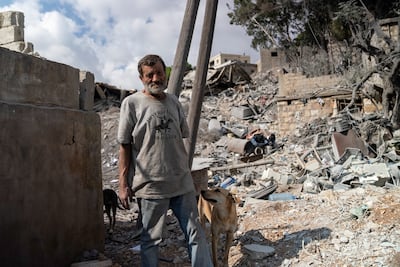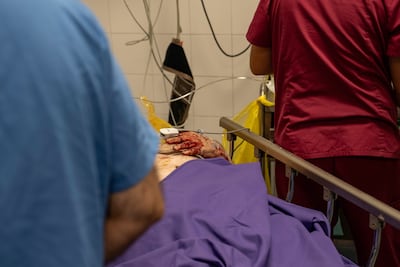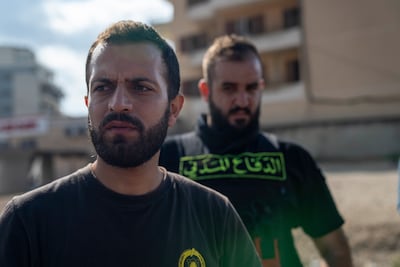Live updates: Follow the latest on Israel-Gaza
The Nabatieh municipal building, or what is left of it, and its courtyard are scattered with packets of bread, nappies, cans of food, and bags of legumes. These much-needed supplies were intended for families who had remained in the war-torn city in south Lebanon. But there's no one left to distribute the aid.
On Thursday morning, a series of Israeli strikes hit Nabatieh, including its municipal buildings, which had been organising humanitarian distribution. At least 16 people were killed, including the mayor, Ahmad Kahil.
Abu Haidar Al Qarar, 43, was one of the volunteers helping with the distribution.
“Some people have been killed here while they came to grab some bread. The supplies are right in front of you – you can see – this is what they say are our munitions,” he told The National, pointing at cans of beans.
A day later, scenes of utter devastation offered only a glimpse of the chaos that followed the Israeli strike. Mr Al Qarar and other volunteers are now clearing the debris. The blast destroyed a three-storey building and damaged another nearby. Rescuers reported seeing bodies reduced to pieces under the rubble.
The strike, the biggest to hit an official building in Lebanon, prompted condemnation. The UN’s special co-ordinator for Lebanon, Jeanine Hennis-Plasschaert, denounced the killing of Mayor Kahil as “alarming”. Lebanon’s caretaker prime minister Najib Mikati said Israel had “intentionally” targeted the council meeting.
In the ruins of Nabatieh, civilians have been paying the highest price since Israel intensified its air campaign against parts of Lebanon on September 23.
“I’ve seen massive destruction and savagery. We’ve pulled out children in pieces, more civilians than you can imagine – they target everything, respect nothing,” said Hussein Jaber, 30, one of more than 20 firefighters stationed at the regional Civil Defence in Nabatieh.
The road to Nabatieh is empty. The once vibrant city is now engulfed in an eerie silence, broken only by the sounds of drones and nearby explosions. On Sunday, another Israeli strike completely levelled an Ottoman-era market dating to 1910.
“This is all our history; it's the most beautiful days of our childhood that we are seeing destroyed right before our eyes. So much destruction – why?” Mr Jaber asked.

‘Ten times worse’ than 2006
Because of the Israeli war, few people remain of the 75,000 residents who lived in the city before the war. Families who have no other places to go to stayed but also elders who don’t imagine a life outside their land. An old man on crutches was seen going through the devastated souqs of Nabatieh.
Wednesday's strike may push the last remaining people out, Mokhtar Mroue, a surgeon at the Nabih Berri Governmental Hospital in Nabatieh, told The National. “There were some people left, but those who were helping them are now gone. One would assume they will now be forced to leave. This was a vicious strike, because of its timing – right when people were going to grab donations. This means [Israel] doesn't want anyone to stay.”
However, Dr Mroue says he won't leave. He and his colleagues at the hospital work tirelessly, despite the intense shelling in the city; one strike even landed 100 metres from the hospital. Ambulances race to the site of each strike – and there are many every day. Just half an hour earlier, one attack injured a man and his family.
Dr Mroue had to perform an emergency procedure in front of journalists, inserting a chest tube in the patient, now in a stable condition.
The surgeon says that he received a call from a Danish number, exhorting him in broken Arabic to leave the area. Many Lebanese have reported similar calls attributed to the Israeli army. He adds that he does not care. This is “10 times” worse than the 2006 war, and people need him in this “savage war”, he says.

The same sense of determination is shown at the Civil Defence of Nabatieh, despite having also paid a heavy price.
On Wednesday, Nagi Fahs, a veteran fireman, was about to rush to the municipality which had just been struck, when another missile destroyed a residential building next to the station. The 50-year-old father of two, was killed by shrapnel from the explosion. Mr Fahs is among the more than 150 rescuers and medical staff who have been killed by Israel since October last year.
“We won't leave until our last breath, even if we die here,” Ali Brahim, a 27-year-old fireman says, as he stands next to a fire engine. It is leaking water and drops are mixing with blood where his colleague was killed, forming a puddle.
“The martyr who died yesterday had a message, and that’s our biggest motivation. We will carry on his mission – the mission of the Lebanese Civil Defense – standing with our people and families,” Mr Jaber says, his voice breaking.
'New military logic'
The Israeli military said on Wednesday it struck dozens of Hezbollah targets in the Nabatieh area. Israel has repeated that the goal of its war, which has killed more than 2,412 people in Lebanon – most of them since the escalation began over three weeks ago – is to “degrade” Hezbollah and ensure the safe return of those displaced from the north.
For Nadim Houry, executive director at the Arab Reform Initiative, the strikes against civilian infrastructures in Nabatieh – particularly the municipality – are further signs of Israel's new “military logic”.
He points to a report released by an organisation affiliated with Israeli intelligence that has listed all civilian infrastructures “established by Hezbollah” in Nabatieh. The report mentions the mayor by name and the “municipal area”.

“This means that Israel will consider all elements of infrastructure – including scouting, municipalities, and hospitals, even those remotely affiliated with Hezbollah – as legitimate targets,” he said.
Hezbollah is a powerful militia and a Lebanese political party with MPs and ministers, offering a vast network of welfare services.
“This is worrying: a civilian institution doesn't lose its protected status based on political affiliation. Israel is deliberately blurring the line of what constitutes a legitimate target. Nothing justifies this attack,” he added, stressing that it is also in contradiction with international humanitarian law.
Human right watch’s Ramzi Kaiss told The National: “Mere affiliation with Hezbollah's non-military institutions does not make an individual a legitimate target. Unless, and only for such time as they directly participate in the hostilities."

